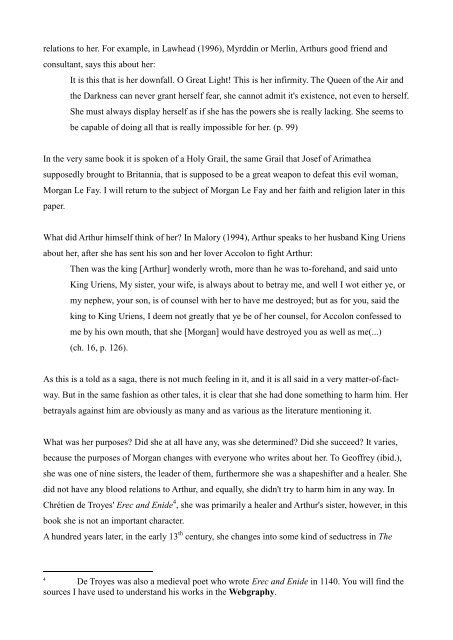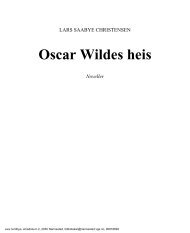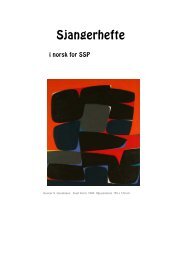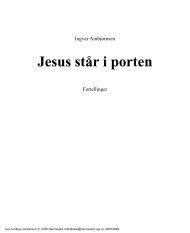Morgan Le Fay: Who was she? A paper written to enlight the woman ...
Morgan Le Fay: Who was she? A paper written to enlight the woman ...
Morgan Le Fay: Who was she? A paper written to enlight the woman ...
You also want an ePaper? Increase the reach of your titles
YUMPU automatically turns print PDFs into web optimized ePapers that Google loves.
elations <strong>to</strong> her. For example, in Lawhead (1996), Myrddin or Merlin, Arthurs good friend and<br />
consultant, says this about her:<br />
It is this that is her downfall. O Great Light! This is her infirmity. The Queen of <strong>the</strong> Air and<br />
<strong>the</strong> Darkness can never grant herself fear, <strong>she</strong> cannot admit it's existence, not even <strong>to</strong> herself.<br />
She must always display herself as if <strong>she</strong> has <strong>the</strong> powers <strong>she</strong> is really lacking. She seems <strong>to</strong><br />
be capable of doing all that is really impossible for her. (p. 99)<br />
In <strong>the</strong> very same book it is spoken of a Holy Grail, <strong>the</strong> same Grail that Josef of Arima<strong>the</strong>a<br />
supposedly brought <strong>to</strong> Britannia, that is supposed <strong>to</strong> be a great weapon <strong>to</strong> defeat this evil <strong>woman</strong>,<br />
<strong>Morgan</strong> <strong>Le</strong> <strong>Fay</strong>. I will return <strong>to</strong> <strong>the</strong> subject of <strong>Morgan</strong> <strong>Le</strong> <strong>Fay</strong> and her faith and religion later in this<br />
<strong>paper</strong>.<br />
What did Arthur himself think of her? In Malory (1994), Arthur speaks <strong>to</strong> her husband King Uriens<br />
about her, after <strong>she</strong> has sent his son and her lover Accolon <strong>to</strong> fight Arthur:<br />
Then <strong>was</strong> <strong>the</strong> king [Arthur] wonderly wroth, more than he <strong>was</strong> <strong>to</strong>-forehand, and said un<strong>to</strong><br />
King Uriens, My sister, your wife, is always about <strong>to</strong> betray me, and well I wot ei<strong>the</strong>r ye, or<br />
my nephew, your son, is of counsel with her <strong>to</strong> have me destroyed; but as for you, said <strong>the</strong><br />
king <strong>to</strong> King Uriens, I deem not greatly that ye be of her counsel, for Accolon confessed <strong>to</strong><br />
me by his own mouth, that <strong>she</strong> [<strong>Morgan</strong>] would have destroyed you as well as me(...)<br />
(ch. 16, p. 126).<br />
As this is a <strong>to</strong>ld as a saga, <strong>the</strong>re is not much feeling in it, and it is all said in a very matter-of-fact-<br />
way. But in <strong>the</strong> same fashion as o<strong>the</strong>r tales, it is clear that <strong>she</strong> had done something <strong>to</strong> harm him. Her<br />
betrayals against him are obviously as many and as various as <strong>the</strong> literature mentioning it.<br />
What <strong>was</strong> her purposes? Did <strong>she</strong> at all have any, <strong>was</strong> <strong>she</strong> determined? Did <strong>she</strong> succeed? It varies,<br />
because <strong>the</strong> purposes of <strong>Morgan</strong> changes with everyone who writes about her. To Geoffrey (ibid.),<br />
<strong>she</strong> <strong>was</strong> one of nine sisters, <strong>the</strong> leader of <strong>the</strong>m, fur<strong>the</strong>rmore <strong>she</strong> <strong>was</strong> a shapeshifter and a healer. She<br />
did not have any blood relations <strong>to</strong> Arthur, and equally, <strong>she</strong> didn't try <strong>to</strong> harm him in any way. In<br />
Chrétien de Troyes' Erec and Enide 4 , <strong>she</strong> <strong>was</strong> primarily a healer and Arthur's sister, however, in this<br />
book <strong>she</strong> is not an important character.<br />
A hundred years later, in <strong>the</strong> early 13 th century, <strong>she</strong> changes in<strong>to</strong> some kind of seductress in The<br />
4 De Troyes <strong>was</strong> also a medieval poet who wrote Erec and Enide in 1140. You will find <strong>the</strong><br />
sources I have used <strong>to</strong> understand his works in <strong>the</strong> Webgraphy.






